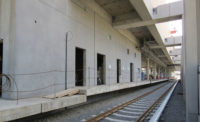Construction professionals are starting to see more in their paychecks as compensation begins to thaw out from the pay freeze of the past few years. However, recruiters say total pay packages aren't improving for all—only specific skill sets are seeing a bump up.
Average base salaries among non-executive-level staff rose 2.4% in 2011 and are expected to rise another 2.69% this year, according to the 2012 salary survey of construction and construction management staff by Personnel Administration Services (PAS), Saline, Mich.
Adding to the improved outlook, fewer companies froze salaries last year. According to the survey, 21% of firms froze salaries in 2011, down from 30% in 2010 and 36% in 2009. Jeff Robinson, president of PAS, says the number keeps shrinking: 14% of firms expect to freeze salaries this year. "The trend is very positive," he says. "Fewer and fewer companies are freezing salaries, in part because you can't freeze them forever and expect to keep people."
Excluding firms that offered no hikes last year, respondents reported an average 3.02% increase in base salary and forecast a 3.14% increase this year. Robinson says such rates should keep construction competitive with other industries. "What construction firms are saying [about compensation rates] is close to what the rest of the world is saying," he adds.
Still, total compensation is a challenge. The percentage of firms offering bonuses continues to drop. In 2007, 80% of companies gave the incentives; last year, only 51% did. Operations staff saw the greatest drop in bonuses, which Robinson says relates to fewer projects under construction in recent years.
Despite the mixed outlook, recruiters see some positive hiring trends. Bob Honour, president of H&H Consultants, Charlotte, N.C., says that while the market is slow overall, there is more demand for staff, such as estimators, engaged early on in projects. He notes that, historically, a demand increase for estimating and preconstruction staff usually indicates that more projects are in the works, with the need for operations staff likely to rise.
Demand also varies, depending on the sectors a job seeker works in. In the Southeast, Honour sees little demand for "standard, vanilla commercial" candidates, but estimators in multifamily and light industrial are hot. "It's always difficult to find quality people, but it has been very tough to find ones with the right experience," he says.
James Huddleston, principal at ProSearch International, also sees increased demand for estimators, especially in the heavy-civil, industrial and power markets. He notes that specific skill sets are also in demand. As more large projects move toward design-build, Huddleston sees a greater need for quality estimators with experience in that procurement. "I could place three of those guys right now at [salaries of] $160,000 and up," he adds.
Huddleston also sees recent civil engineering and construction graduates getting a 5% to 10% bump in base salary, if they are trained in building information modeling. "Most of the top self-perform firms are offering $58,000 and up, if you have those skill sets," he says.
After years of layoffs, recruiters differ on what an improved market means for hiring. Dollie Lee of Professional Search, Douglasville, Ga., says many candidates who have been out of work for more than six months are much less desirable. "A lot of companies won't hire them," she says. "It's almost a waste of time to try."




Post a comment to this article
Report Abusive Comment